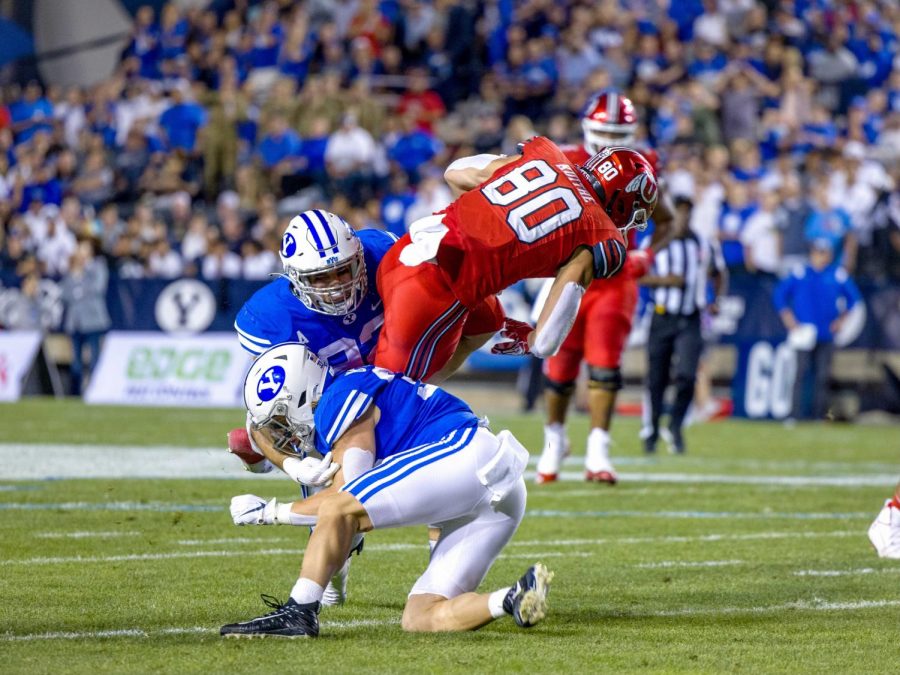Early into my freshman year, I sat in the Mighty Utah Student Section ready to watch an anticipated match against our rival and neighboring school, Brigham Young University. The excitement was palpable as the pregame preparations began and the decibel level rose. It seemed fun at first to join the crowd in booing the opposing team as they took the field.
But as the game unfolded, the hostility intensified. As my classmates cheered for the U, many began to target the assumed faith of the BYU players.
I thought to myself, do they not realize that Coach Whittingham is a Latter-day Saint? Don’t they know that Britain Covey just returned from his mission? What would they say to me if they knew I was a “Mormon?”
It was a disheartening experience for me to witness my peers express such disdain for not only a rival team but an entire faith and community that I and over 30% of other U students identified with.
This experience helped me realize that this rivalry is distinct from others I had previously been a part of.
This rivalry concerns more than football scores and trivial animosity found between neighboring high schools. It includes unique aspects that unnecessarily involve religious and cultural stereotypes.
Both fanbases uphold negative and unproductive stereotypes about the other institution.
The Disconnect
The rivalry in its current form limits our ability to build an inclusive community at the U.
Hostile rhetoric directed at any group of people is completely inappropriate.
Making disparaging and generalizing comments targeted at a community that a massive block of the student body belongs to requires ignorance.
Having been at the receiving end of these comments, I believe there is a disconnect in the knowledge of the prevalence of Latter-day Saints at the U. I see this as one barrier among many that impede our ability to build a more embracive culture. Admittedly, other barriers certainly stem from a lack of inclusivity and awareness from my faith community.
Promoting education and open dialogue surrounding faith traditions represented by the student body will lead to greater mutual respect.
The Student Interfaith Coalition, which I am president and founder of, emphasizes this important work. We are dedicated to fostering a community that celebrates pluralism and promotes dialogue.
As negative interactions are phased out, a more inclusive environment will be solidified.
A goal of our institution should be to cultivate a community where students of any background feel welcome.
I certainly did not feel welcome as a member of my faith while standing in the MUSS that night, and I do not wish that feeling upon my classmates of any identity.
Division
We are contributing to the interfaith division present in our state.
I believe that the BYU-Utah rivalry is a microcosm of the poor interfaith relations that characterize the state of Utah.
As the state’s most well-known and influential universities, the U and BYU should lead the way in diminishing division, rather than contributing to it.
We can serve as an example for the rest of the state by displaying our pluralism and maturity. This generation of students will soon become the lawmakers and leaders of Utah. Practicing inclusivity today can help lead to a successful future.
Now that the Utes and Cougars will again compete across athletics in the Big 12 Conference, we have a special opportunity to redefine this rivalry.
Rather than allow our rivalry to serve as a source of division, we should channel our passion into productive collaboration where we push each other athletically and academically.
We are presented with the opportunity to enter into a new era, one that fosters bridge-building while still emphasizing fierce competition.
Change Begins With Us
This change begins with the students and our treatment of each other. It starts by educating one another and analyzing personally held biases. We must replace hostile banter with open dialogue that recognizes our differences as points of strength, not sources of contention. The way forward is not to shy away from competition, but to embrace it in a way that builds bridges rather than walls.
Let’s pledge to change the narrative as we gear up for the upcoming “Holy War” between the Utes and Cougars.
Together, we can transform a rivalry built on division into one rooted in respect and collaboration.
By doing so, we can support establishing more inclusive communities and initiate better interfaith relations across the state.
– Matthew K. Hyde, President of the Interfaith Coalition
The Daily Utah Chronicle publishes guest op-eds written by faculty, elected officials and other members of the public on topics relevant to students at the University of Utah. The Chronicle welcomes guest op-ed pitches here.




Matt Allen • Nov 10, 2024 at 6:31 am
Thank you for l4eading, and for writing. Excellent article Matt, now, more than ever. Celebrate and build on our many commonalities, handiwork to understand our differences. Support each other on the challenges we face, together.
Kristin Meza Kristin Meza • Nov 9, 2024 at 3:48 pm
Thanks Matt- thoughtfully taught and gratefully appreciated!